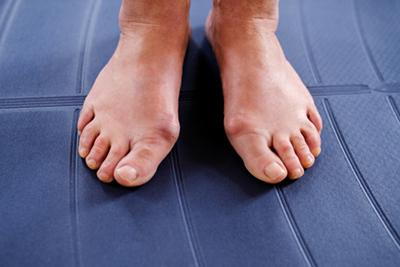Signs and Symptoms of a Bunion
posted: Oct. 18, 2024.

Bunions are a common foot problem, especially for women. Narrow pointed-toe shoes can contribute to bunion formation. Your podiatrist can help you get relief from bunions.
Causes of Bunions
Bunions are caused by a genetic bone deformity that makes the big toe joint protrude outward. This joint can begin to rub on the inside of your shoe, causing friction that causes inflammation, which can develop into a bunion.
Signs and Symptoms of a Bunion
A bunion will look like a hard, bony bump on the side of your big toe. Bunions can be small or large, painful or non-painful.
Risk Factors for Bunions
You are at greater risk of developing a bunion if you have osteoarthritis or rheumatoid arthritis, are a woman, and if you wear narrow shoes.
What to Do if You Develop a Bunion
For small bunions with little to no bone involvement, you can try a few simple remedies, including:
- Placing ice on the bunion to reduce swelling
- Taping the bunion to add support
- Placing padding inside your shoes to add cushion and protection
- Taking over-the-counter anti-inflammatory medication and pain medication
- Changing to wider shoes with more room for your toes
When to See a Podiatrist for a Bunion
You should see a podiatrist if your bunion is:
- Large and painful
- Making it difficult to put on shoes
- Making it painful to stand or walk
- Unresponsive to home treatments
How a Podiatrist Can Help When You Have a Bunion
A podiatrist will thoroughly examine your foot, which may include imaging to determine the level of bone involvement. For bunions with little to no bone involvement, your podiatrist may recommend:
- Custom-fit orthotics or footwear to help realign your toe and foot
- Physical therapy exercises and stretching to maintain flexibility
- Wearing pads or cushions inside your shoes
- Removing corns or calluses to eliminate friction
When You Might Need Bunion Surgery
You might need bunion surgery if there is significant bone involvement or in cases of moderate to severe bunion pain that is interfering with your daily life.
What You Can Expect from Bunion Surgery
When you have bunion surgery, known as a bunionectomy, your surgeon will remove the bunion and surgically realign the bones in your toe and foot.
Want To Know More?
To learn more about the causes, prevention, and treatment of bunions, call Dr. Matthew Ward at Marietta Podiatry Group in Marietta, GA. You can reach them in the office by calling (770) 422-9856, so call today.
